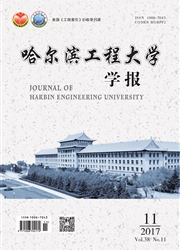

 中文摘要:
中文摘要:
To capture the presence of speech embedded in nonspeech events and background noise in short-wave non-cooperative communication,an algorithm for speech-stream detection in noisy environments is presented based on Empirical Mode Decomposition (EMD) and statistical properties of higher-order cumulants of speech signals.With the EMD,the noise signals can be decomposed into different numbers of IMFs.Then,the fourth-order cumulant (FOC) can be used to extract the desired feature of statistical properties for IMF components.Since the higher-order cumulants are blind for Gaussian signals,the proposed method is especially effective regarding the problem of speech-stream detection,where the speech signal is distorted by Gaussian noise.With the self-adaptive decomposition by EMD,the proposed method can also work well for non-Gaussian noise.The experiments show that the proposed algorithm can suppress different noise types with different SNRs,and the algorithm is robust in real signal tests.
 英文摘要:
英文摘要:
To capture the presence of speech embedded in nonspeech events and background noise in shortwave non-cooperative communication, an algorithm for speech-stream detection in noisy environments is presented based on Empirical Mode Decomposition (EMD) and statistical properties of higher-order cumulants of speech signals. With the EMD, the noise signals can be decomposed into different numbers of IMFs. Then, the fourth-order cumulant ( FOC ) can be used to extract the desired feature of statistical properties for IMF components. Since the higher-order eumulants are blind for Gaussian signals, the proposed method is especially effective regarding the problem of speech-stream detection, where the speech signal is distorted by Gaussian noise. With the self-adaptive decomposition by EMD, the proposed method can also work well for non-Gaussian noise. The experiments show that the proposed algorithm can suppress different noise types with different SNRs, and the algorithm is robust in real signal tests.
 同期刊论文项目
同期刊论文项目
 同项目期刊论文
同项目期刊论文
 期刊信息
期刊信息
